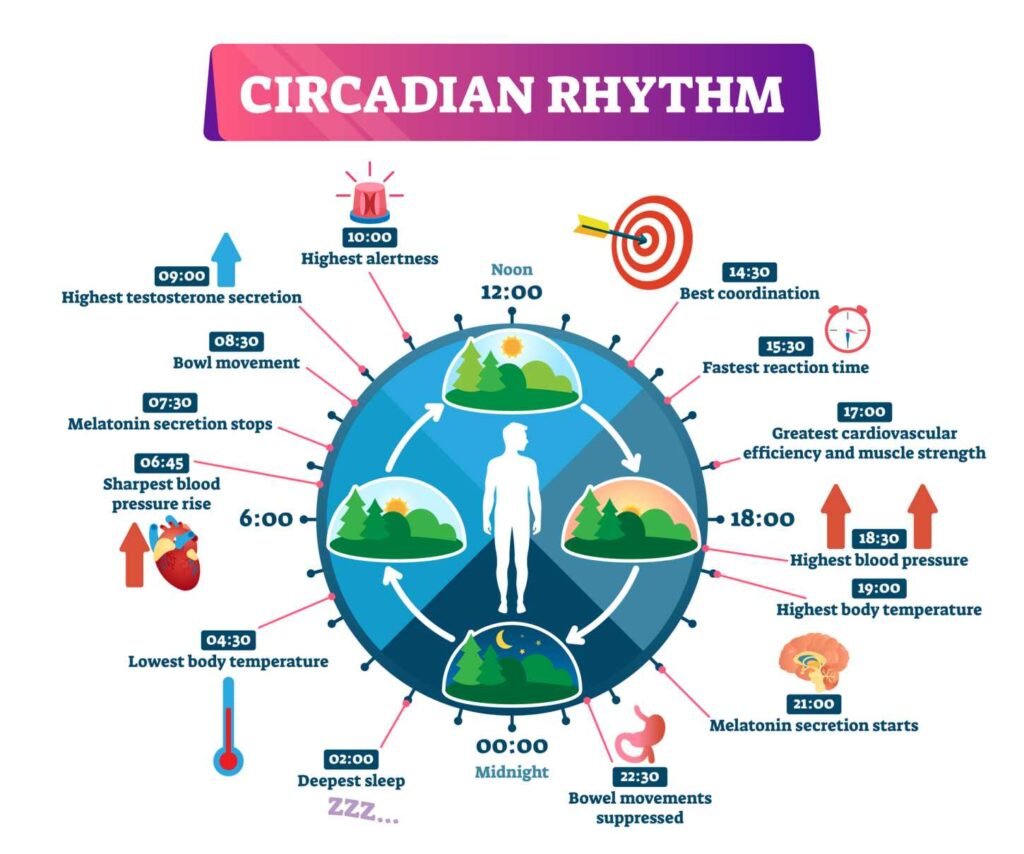Advanced sleep-wake phase disorder (ASWPD) is a sleep disorder that affects the timing of an individual’s sleep-wake cycle.
People with Advanced sleep-wake phase disorder (ASWPD) tend to fall asleep and wake up earlier than what is considered typical. This disorder is caused by a misalignment between an individual’s internal biological clock and the external environment, leading to a disruption in their circadian rhythm.
Advanced sleep-wake phase disorder is a rare disorder, affecting less than 1% of the population. It is more common in older adults, with the onset usually occurring in adolescence or early adulthood. The disorder can have a significant impact on an individual’s daily life, as they may have difficulty staying awake during the day and may experience insomnia at night.

Circadian rhythms play a crucial role in regulating an individual’s sleep-wake cycle, and disruptions to this rhythm can lead to various sleep disorders, including ASWPD. While there is no cure for ASWPD, there are treatments available that can help manage the symptoms and improve an individual’s quality of life.
Understanding Circadian Rhythms
Circadian rhythms are physical, mental, and behavioral changes that follow a 24-hour cycle. These rhythms are controlled by an internal biological clock, which is located in the suprachiasmatic nucleus (SCN) of the hypothalamus. The SCN receives information about light and darkness from the eyes, and uses this information to synchronize the body’s biological clock with the external environment.
Role in Sleep-Wake Cycle
Circadian rhythms play a crucial role in regulating the sleep-wake cycle. The biological clock promotes wakefulness during the day and sleepiness at night. This cycle is controlled by the release of hormones such as cortisol, which peaks in the morning and decreases at night, and melatonin, which is released at night and promotes sleep.
Disorders of Circadian Rhythm
Disorders of circadian rhythm occur when the biological clock is disrupted, leading to sleep problems and other health issues. Advanced sleep-wake phase disorder (ASWPD) is one such disorder, which causes individuals to feel sleepy and go to bed earlier than usual, and wake up earlier than usual. This can lead to difficulty staying awake in the evening and early morning hours, and can interfere with daily activities.
Other disorders of circadian rhythm include delayed sleep-wake phase disorder (DSWPD), non-24-hour sleep-wake disorder (N24SWD), and irregular sleep-wake rhythm disorder (ISWRD). These disorders can cause difficulties falling asleep, staying asleep, and waking up at the desired time.
In conclusion, understanding circadian rhythms is crucial to maintaining healthy sleep patterns and overall well-being. Disruptions to the biological clock can lead to a variety of sleep disorders, which can have negative impacts on physical and mental health.
Advanced Sleep-Wake Phase Disorder (ASWPD)
Definition and Symptoms
Advanced Sleep-Wake Phase Disorder (ASWPD) is a type of circadian rhythm sleep disorder that affects the timing of sleep. Individuals with ASWPD have a sleep-wake cycle that is shifted earlier than the typical 24-hour cycle. This means that they feel sleepy and go to bed earlier in the evening, and wake up earlier in the morning than most people.
The symptoms of ASWPD can include difficulty staying awake in the evening, difficulty sleeping in the morning, and feeling excessively sleepy during the day. Individuals with ASWPD may also experience insomnia, which can lead to difficulty falling asleep or staying asleep. This can result in a number of negative consequences, including fatigue, decreased productivity, and impaired social and occupational functioning.
Epidemiology
Advanced Sleep-Wake Phase Disorder is a relatively rare sleep disorder, affecting less than 1% of the general population. It is more common in older adults, with a peak prevalence in individuals over the age of 60. ASWPD is also more common in individuals with certain medical conditions, such as depression and bipolar disorder.
Research has suggested that ASWPD may be caused by a genetic mutation that affects the body’s internal clock, which regulates sleep-wake cycles. However, more research is needed to fully understand the underlying causes of ASWPD.
In conclusion, ASWPD is a circadian rhythm sleep disorder that affects the timing of sleep, causing individuals to feel sleepy and go to bed earlier in the evening, and wake up earlier in the morning than most people. It is a relatively rare disorder, but can have negative consequences on an individual’s daily functioning.
Causes and Risk Factors
Genetic Influences
Advanced sleep-wake phase disorder (ASWPD) is believed to have a genetic component. Several genes have been associated with the disorder, including the PER2, PER3, and CRY1 genes. These genes are involved in regulating the body’s internal clock, which controls the sleep-wake cycle. Individuals with certain variations in these genes may be more susceptible to developing ASWPD.
Environmental Factors
Environmental factors can also play a role in the development of ASWPD. Exposure to bright light at night can disrupt the body’s internal clock and lead to sleep disturbances. Shift work, which involves working during the night and sleeping during the day, can also disrupt the sleep-wake cycle and increase the risk of developing ASWPD.
Other risk factors for ASWPD include a family history of the disorder and certain medical conditions, such as depression and bipolar disorder. Additionally, ASWPD is more common in adolescents and young adults, and tends to affect males more often than females.
Overall, the exact causes of ASWPD are not fully understood and further research is needed to better understand the genetic and environmental factors that contribute to the disorder.
Diagnosis and Evaluation
Clinical Diagnosis
Advanced sleep-wake phase disorder (ASWPD) is a circadian rhythm sleep disorder that is characterized by a persistent pattern of early sleep onset and awakening times that are earlier than what is desired or considered normal. Clinical diagnosis of ASWPD is based on a detailed medical history, sleep diary, and physical examination.
The American Academy of Sleep Medicine (AASM) has established diagnostic criteria for ASWPD, which include a consistent sleep onset time that is at least 2 hours earlier than the desired or socially acceptable time, and a consistent wake-up time that is at least 2 hours earlier than the desired or socially acceptable time, resulting in a total sleep time of 6 hours or more per night.
Diagnostic Tools
Actigraphy, polysomnography, and sleep diary are the most commonly used diagnostic tools for ASWPD. Actigraphy is a non-invasive method that uses a device worn on the wrist to monitor sleep and wake patterns. Polysomnography is a diagnostic test that records brain waves, heart rate, breathing, and eye movements during sleep. Sleep diary is a self-reported record of sleep and wake times, as well as other sleep-related behaviors, such as caffeine intake, exercise, and naps.
The AASM Clinical Practice Guideline recommends the use of actigraphy and sleep diary to diagnose ASWPD. Polysomnography is not routinely recommended for the diagnosis of ASWPD, but may be useful in ruling out other sleep disorders that can cause similar symptoms.
In conclusion, a clinical diagnosis of ASWPD is based on a detailed medical history, sleep diary, and physical examination. Actigraphy and sleep diary are the most commonly used diagnostic tools for ASWPD, and are recommended by the AASM Clinical Practice Guideline. Polysomnography may be useful in ruling out other sleep disorders.
Treatment and Management
Chronotherapy
Chronotherapy is a behavioral intervention that involves gradually delaying bedtime and wake-up times over several days or weeks. This treatment is effective for individuals with advanced sleep-wake phase disorder, as it helps to reset the circadian rhythm. Chronotherapy can be combined with other treatments such as light therapy and pharmacotherapy for better results.
Pharmacotherapy
Pharmacotherapy involves the use of medications to treat advanced sleep-wake phase disorder. Melatonin supplements and melatonin receptor agonists are commonly used to help regulate the sleep-wake cycle. However, it is important to consult with a healthcare professional before taking any medication.
Light Therapy
Light therapy involves exposure to bright light in the morning to help reset the circadian rhythm. This treatment is effective for individuals with advanced sleep-wake phase disorder, as it helps to regulate the sleep-wake cycle. Light therapy can be combined with other treatments such as chronotherapy and pharmacotherapy for better results.
Lifestyle and Behavioral Interventions
Lifestyle and behavioral interventions are important for managing advanced sleep-wake phase disorder. Sleep hygiene practices such as avoiding caffeine and alcohol before bedtime, maintaining a regular sleep schedule, and creating a comfortable sleep environment can help improve sleep quality. Behavioral interventions such as cognitive-behavioral therapy can also be effective in managing advanced sleep-wake phase disorder.
In conclusion, there are various treatment options available for individuals with advanced sleep-wake phase disorder. It is important to consult with a healthcare professional to determine the best treatment plan based on individual needs and preferences.
Associated Conditions and Comorbidities
Sleep Disorders
Advanced sleep-wake phase disorder (ASWPD) is a circadian rhythm sleep disorder that affects the timing of sleep and wakefulness. Individuals with ASWPD have a tendency to fall asleep earlier in the evening and wake up earlier in the morning than what is considered normal. This can lead to difficulty falling asleep at night and excessive daytime sleepiness. ASWPD is often comorbid with other sleep disorders such as insomnia, delayed sleep phase disorder, non-24-hour sleep-wake rhythm disorder, irregular sleep-wake rhythm disorder, and obstructive sleep apnea.
Neurodevelopmental and Neurodegenerative Disorders
ASWPD has also been found to be associated with various neurodevelopmental and neurodegenerative disorders. Individuals with dementia, including Alzheimer’s disease, often experience changes in their sleep patterns, including early-morning awakenings and increased daytime napping. ASWPD has also been observed in individuals with autism spectrum disorder, who may have difficulty falling asleep at night and experience daytime sleepiness. Additionally, individuals with narcolepsy, a neurological disorder characterized by excessive daytime sleepiness and sudden sleep attacks, may also exhibit symptoms of ASWPD.
Overall, ASWPD is a complex disorder that often co-occurs with other sleep and neurological disorders. Further research is needed to better understand the underlying mechanisms and to develop effective treatment strategies.
Impacts and Complications
Daily Functioning and Quality of Life
Individuals with advanced sleep-wake phase disorder (ASWPD) often experience significant disruptions in their daily functioning and quality of life. Due to the early onset of sleep and wake times, affected individuals may struggle to maintain a regular social life or participate in evening activities. This can lead to feelings of isolation and social withdrawal.
Moreover, individuals with ASWPD may experience chronic sleep deprivation, which can have a negative impact on their overall health and well-being. Chronic sleep deprivation can lead to a range of physical and mental health issues, including obesity, diabetes, depression, and anxiety.
Long-Term Health Outcomes
Chronic sleep deprivation can also have long-term health consequences. Studies have shown that individuals who experience chronic sleep deprivation are at an increased risk of developing a range of health conditions, including cardiovascular disease, stroke, and cancer.
In addition, ASWPD can have a significant impact on an individual’s cognitive functioning. Excessive daytime sleepiness, poor concentration, and attention deficits are common among individuals with ASWPD. This can make it difficult for affected individuals to perform well in school or at work.
Overall, ASWPD can have a significant impact on an individual’s daily functioning, quality of life, and long-term health outcomes. It is important for individuals with ASWPD to seek treatment to help manage their symptoms and improve their overall health and well-being.
Research and Future Directions
Genetic Research
Recent research has shown that there is a strong genetic basis for Advanced Sleep-Wake Phase Disorder (ASWPD). Several genes have been identified that are associated with the disorder, including PER1, PER2, and CRY1. These genes are involved in regulating the body’s circadian rhythm, which is disrupted in people with ASWPD.
Meta-analyses and systematic literature reviews have been conducted to identify the specific genetic variants that are associated with ASWPD. These studies have identified several single nucleotide polymorphisms (SNPs) that are significantly associated with the disorder. However, further research is needed to fully understand the genetic basis of ASWPD.
Advancements in Treatments
Currently, there is no cure for ASWPD, and treatment options are limited. However, there have been some advancements in the development of treatments for the disorder.
One approach that has shown promise is the use of light therapy. This involves exposing individuals with ASWPD to bright light in the morning, which can help reset their circadian rhythm. Another approach is the use of melatonin, a hormone that regulates sleep-wake cycles. Melatonin supplements have been shown to be effective in improving sleep quality and reducing symptoms of ASWPD.
The GRADE approach has been used to evaluate the effectiveness of these treatments. While the evidence is limited, the available studies suggest that light therapy and melatonin may be effective in treating ASWPD.
Overall, further research is needed to fully understand the genetic basis of ASWPD and to develop more effective treatments for the disorder.
Frequently Asked Questions
What are the common symptoms of Advanced Sleep Phase Disorder?
Individuals with Advanced Sleep-Wake Phase Disorder (ASWPD) experience a shift in their circadian rhythm, causing them to fall asleep and wake up earlier than the typical sleep schedule. The common symptoms include difficulty staying awake in the evening, waking up too early in the morning, and feeling fatigued during the day.
What treatments are available for Advanced Sleep-Wake Phase Disorder?
The treatment for ASWPD is focused on resetting the circadian rhythm. Light therapy, chronotherapy, and melatonin supplements are some of the commonly used treatments. Light therapy involves exposure to bright light in the morning to shift the sleep-wake cycle. Chronotherapy involves gradually delaying the sleep time until it aligns with the desired schedule. Melatonin supplements are used to regulate the sleep-wake cycle.
What causes Advanced Sleep Phase Disorder?
The exact cause of ASWPD is not known, but it is believed to be caused by a combination of genetic and environmental factors. Some studies suggest that mutations in the genes responsible for the circadian rhythm may contribute to the development of ASWPD.
Can Advanced Sleep Phase Disorder have long-term health impacts?
ASWPD is considered a chronic condition, but it is not associated with any significant long-term health impacts. However, it can affect an individual’s quality of life and lead to social and occupational difficulties.
How does light therapy work in treating Advanced Sleep Phase Disorder?
Light therapy involves exposure to a bright light source in the morning to shift the sleep-wake cycle. The light exposure suppresses the production of melatonin, which is a hormone that regulates the sleep-wake cycle. This, in turn, resets the circadian rhythm and helps individuals with ASWPD to fall asleep and wake up at a desired time.
What role does melatonin play in managing Advanced Sleep-Wake Phase Disorder?
Melatonin is a hormone that regulates the sleep-wake cycle. It is produced by the pineal gland in response to darkness and helps to promote sleep. In individuals with ASWPD, melatonin supplements are used to regulate the sleep-wake cycle. Melatonin supplements are taken in the evening to promote sleep and help individuals with ASWPD to fall asleep at a desired time.
Understanding Circadian Rhythm: The Body’s Natural Clock Explained

Circadian rhythms are physical, mental, and behavioral changes that follow a roughly 24-hour cycle, responding primarily to light and darkness in an organism’s environment. These rhythms are driven by an internal biological clock, which is known as the circadian clock or the biological clock.
Continue reading: Understanding Circadian Rhythm
MaryRuth Organics Sleep Gummies Without Melatonin Review: Do They Work?

These gummies are designed to promote relaxation and support sleep quality for adults. Unlike many other sleep aids, they don’t contain melatonin, so you won’t wake up feeling groggy or drowsy.
Continue reading: MaryRuth Organics Sleep Gummies Without Melatonin
Reclaiming Deep Restful Sleep: The Magnesium Deficiency Solution

Discover the natural solution to deep, restful sleep and magnesium deficiency through the efficacy of PUREDOSE® Micelle Liposomal Magnesium. This superior bioavailable supplement promotes optimal sleep support and overall well-being.
Continue reading: Reclaiming Deep Restful Sleep





